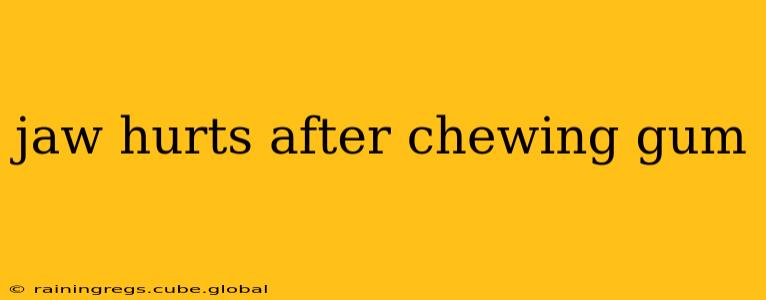Chewing gum, a seemingly innocuous habit, can sometimes lead to jaw pain. This discomfort can range from a mild ache to a sharp, debilitating pain, significantly impacting daily life. Understanding the underlying causes is the first step towards finding relief and preventing future occurrences. This comprehensive guide explores the reasons why your jaw might hurt after chewing gum, effective remedies, and preventative measures to protect your jaw's health.
Why Does My Jaw Hurt After Chewing Gum?
Several factors can contribute to jaw pain after chewing gum. The intensity and duration of the pain can vary depending on the cause.
Temporomandibular Joint (TMJ) Disorders:
This is a common culprit. The TMJ connects your jawbone to your skull, and disorders affecting this joint can cause pain, clicking, popping, and limited jaw movement. Excessive chewing, like that involved in prolonged gum chewing, can exacerbate existing TMJ problems or even trigger new ones. Symptoms might include pain in the jaw, temples, or ears, and headaches.
Muscle Strain or Overuse:
Vigorous or prolonged chewing, particularly with stiff or hard gum, can strain the muscles responsible for jaw movement. This overuse can lead to inflammation and pain, often felt in the jaw, temples, or even the neck and shoulders. Think of it like any other muscle strain – overuse leads to fatigue and pain.
Bruxism (Teeth Grinding):
While not directly caused by gum chewing, the repetitive jaw movements involved can worsen bruxism, the unconscious grinding or clenching of teeth. This can lead to significant jaw pain, especially if the gum chewing is done forcefully or for extended periods.
Clenching or Grinding While Chewing:
Even without diagnosed bruxism, consciously or unconsciously clenching your jaw while chewing gum can put excessive stress on the muscles and joints, resulting in pain.
Underlying Dental Issues:
Problems like tooth decay, gum disease (gingivitis or periodontitis), or improperly aligned teeth (malocclusion) can contribute to jaw pain, especially when exacerbated by the repetitive motion of chewing gum.
What Can I Do If My Jaw Hurts After Chewing Gum?
Addressing jaw pain requires a multifaceted approach depending on the underlying cause.
Rest Your Jaw:
Avoid chewing gum, hard candies, or anything that requires strenuous jaw movement for a few days to allow the muscles and joint to rest and heal.
Apply Heat or Ice:
Alternating between warm compresses (to relax muscles) and cold compresses (to reduce inflammation) can provide relief.
Over-the-Counter Pain Relief:
Nonsteroidal anti-inflammatory drugs (NSAIDs) like ibuprofen or naproxen can help manage pain and inflammation. Always follow the recommended dosage.
Gentle Jaw Exercises:
Once the initial pain subsides, gentle jaw exercises prescribed by a physical therapist or dentist can help improve range of motion and strengthen the jaw muscles.
How Can I Prevent Jaw Pain from Chewing Gum?
Prevention is key to avoiding jaw pain.
Chew Less Frequently:
Reduce the amount of time you spend chewing gum. Take breaks and be mindful of how often you're chewing.
Choose Softer Gum:
Opt for softer varieties of chewing gum instead of firm or hard types that require more forceful chewing.
Be Mindful of Your Chewing Technique:
Avoid clenching or grinding your teeth while chewing. Focus on relaxed jaw movements.
Maintain Good Oral Hygiene:
Regular brushing, flossing, and dental checkups are essential for preventing dental problems that can contribute to jaw pain.
Can Jaw Pain After Chewing Gum Be a Sign of Something Serious?
While often due to simple muscle strain, persistent or severe jaw pain after chewing gum could indicate a more serious condition like TMJ disorder, bruxism, or an underlying dental issue. If the pain is severe, persistent, or accompanied by other symptoms like headaches, earaches, or clicking in the jaw, consult a dentist or doctor promptly for proper diagnosis and treatment.
When Should I See a Doctor or Dentist?
Seek professional help if:
- The pain is severe or persistent.
- The pain is accompanied by other symptoms like headaches, earaches, or difficulty opening your mouth.
- Over-the-counter pain relief doesn't provide adequate relief.
- You suspect you might have TMJ disorder or bruxism.
By understanding the causes, remedies, and preventive measures, you can enjoy the occasional indulgence of chewing gum without compromising your jaw's health. Remember, prevention and early intervention are crucial in managing jaw pain.
